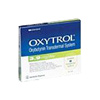 | Oxytrol (Halarase) Active Ingredient: Oxybutynin Oxytrol is used for relieving symptoms of bladder problems (urinary urgency, frequency, or leakage; loss of bladder control; and painful urination) in certain patients. Other names for this medication: Cobapolas, Cystonorm, Cystrin, Delaiv, Delak, Delifon, Detrusan, Dresplan, Dridase, Eurin, Fandeheede, Frenurin, Gelnique, Halarase, Incontinol, Inobase, Kentera, Lenditro, Lyrinel, Mutum, Neluos, Novitropan, Nu-oxybutyn, Orivate, Oxybutynine, Oxymedin, Oxyurin, Palnaxol, Pms-oxybutynin, Pollakisu, Porabutin, Poratile, Postinin, Retebem, Retemic, Retemicon, Reteven, Socliden, Spasyt, Tavor, Urazol, Urequin, Urgent, Uricont, Urihexal, Uromax, Uropan, Uropran, Uroton, Uroxal Show all |
| Package | Per Pill | Price | Savings | Bonus | Order |
|---|---|---|---|---|---|
| 5mg × 30 pills | $1.73 | $51.84 | + Cialis | ||
| 5mg × 60 pills | $1.46 | $87.35 | $16.33 | + Ed trial pack 3 | |
| 5mg × 90 pills | $1.37 | $122.86 | $32.66 | + Levitra |
| Package | Per Pill | Price | Savings | Bonus | Order |
|---|---|---|---|---|---|
| 2.5mg × 30 pills | $1.21 | $36.24 | + Viagra | ||
| 2.5mg × 60 pills | $0.99 | $59.43 | $13.05 | + Cialis | |
| 2.5mg × 90 pills | $0.92 | $82.63 | $26.09 | + Ed trial pack 3 |
INDICATIONS
Oxytrol (oxybutynin) reduces muscle spasms of the bladder and urinary tract.
Oxytrol is used to treat symptoms of overactive bladder, such as frequent or urgent urination, incontinence (urine leakage), and increased nighttime urination.
Oxytrol may also be used for purposes not listed in this medication guide.INSTRUCTIONS
Use Oxytrol exactly as prescribed by your doctor. Do not use in larger or smaller amounts or for longer than recommended. Follow the directions on your prescription label.
Oxytrol comes with patient instructions for safe and effective use. Follow these directions carefully. Ask your doctor or pharmacist if you have any questions.DOSAGE
Adults: The usual dose is 5mg two or three times a day. This may be increased to a maximum of 5 mg four times a day to obtain a clinical response provided that the side effects are tolerated.
Elderly (including frail elderly): The elimination half-life is increased in the elderly. Therefore, a dose of 2.5mg twice a day, particularly if the patient is frail, is likely to be adequate. This dose may be titrated upwards to 5mg two times a day to obtain a clinical response provided the side effects are well tolerated.
Children (under 5 years of age): Not recommended.
Children (over 5 years of age): Neurogenic bladder instability: the usual dose is 2.5mg twice a day. This dose may be titrated upwards to 5mg two or three times a day to obtain a clinical response provided the side effects are well tolerated. Nocturnal enuresis: the usual dose is 2.5mg twice a day. This dose may be titrated upwards to 5mg two or three times a day to obtain a clinical response provided the side effects are tolerated. The last dose should be given before bedtime.STORAGE
Store this medicine at room temperature in a tightly-closed container, away from heat and light.
MORE INFO:
Active ingredient: Oxybutynin
Do not use Oxytrol if you are allergic to oxybutynin, or if you have:
untreated or uncontrolled glaucoma;
a blockage in your digestive tract (stomach or intestines); or
if you have decreased urination or are unable to urinate.
To make sure you can safely use Oxytrol, tell your doctor if you have any of these other conditions:
glaucoma;
liver disease;
kidney disease;
myasthenia gravis;
an enlarged prostate;
an intestinal disorder, such as ulcerative colitis; or
a stomach disorder such as gastroesophageal reflux disease (GERD) or slow digestion.
FDA pregnancy category B. Oxytrol is not expected to be harmful to an unborn baby. Tell your doctor if you are pregnant or plan to become pregnant during treatment. It is not known whether oxybutynin passes into breast milk or if it could harm a nursing baby. Do not use Oxytrol without telling your doctor if you are breast-feeding a baby.Important safety information:
Before using Oxytrol, tell your doctor if you regularly use other medicines that make you sleepy (such as cold or allergy medicine, sedatives, narcotic pain medicine, sleeping pills, muscle relaxers, and medicine for seizures, depression, or anxiety). They can add to sleepiness caused by oxybutynin.
Tell your doctor about all other medicines you use, especially:
atropine (Donnatal, and others);
belladonna;
dicyclomine (Bentyl);
glycopyrrolate (Robinul);
hyoscyamine (Anaspaz, Cystospaz, Levsin, and others);
mepenzolate (Cantil);
methantheline (Provocholine);
methscopolamine (Pamine);
propantheline (Pro-Banthine);
scopolamine (Transderm-Scop);
an antibiotic such as clarithromycin (Biaxin), dalfopristin/quinupristin (Synercid), erythromycin (E.E.S., EryPed, Ery-Tab, Erythrocin, Pediazole), or telithromycin (Ketek); or
antifungal medicine such as itraconazole (Sporanox), ketoconazole (Extina, Ketozole, Nizoral, Xolegal), miconazole (Oravig), or voriconazole (Vfend).
This list is not complete and other drugs may interact with Oxytrol. Tell your doctor about all medications you use. This includes prescription, over-the-counter, vitamin, and herbal products. Do not start a new medication without telling your doctor.Get emergency medical help if you have any of these signs of an allergic reaction to Oxytrol: hives; difficulty breathing; swelling of your face, lips, tongue, or throat. Stop using Oxytrol and call your doctor at once if you have a serious side effect such as:
fever with hot, dry skin;
uneven heart rate;
pain or burning when you urinate;
urinating less than usual or not at all; or
severe itching, burning, or blistering that does not clear up within several hours after removing the skin patch.
Less serious Oxytrol side effects may include:
mild skin itching, burning, redness, or discoloration where a patch was worn;
dizziness, drowsiness, weakness;
dry eyes, blurred vision;
dry mouth;
warmth, tingling, or redness under your skin;
nausea, vomiting, stomach pain;
constipation or diarrhea;
stuffy nose;
back pain;
feeling restless; or
sleep problems (insomnia).
This is not a complete list of side effects and others may occur. Call your doctor for medical advice about side effects.
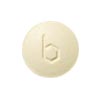 NaltrexoneNaltrexone is used to treat narcotic drug or alcohol addiction.as low as $7.42
NaltrexoneNaltrexone is used to treat narcotic drug or alcohol addiction.as low as $7.42 ClozarilClozaril is used for managing schizophrenia in patients who do not respond to other medicines.as low as $0.3
ClozarilClozaril is used for managing schizophrenia in patients who do not respond to other medicines.as low as $0.3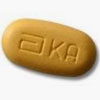 KaletraKaletra is a combination of Ritonavir 50 mg and Lopinavir 200 mg, both of which belong to the category of anti-viral medicines. as low as $3.31
KaletraKaletra is a combination of Ritonavir 50 mg and Lopinavir 200 mg, both of which belong to the category of anti-viral medicines. as low as $3.31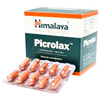 PicrolaxPicrolax is a himalaya herbal formulation used for the treatment of constipation.as low as $22.47
PicrolaxPicrolax is a himalaya herbal formulation used for the treatment of constipation.as low as $22.47 AsacolAsacol is used to treat and prevent an inflammatory bowel disease called ulcerative colitis. It works inside the intestines (bowel) to reduce the inflammation and other symptoms of the disease.as low as $1.15
AsacolAsacol is used to treat and prevent an inflammatory bowel disease called ulcerative colitis. It works inside the intestines (bowel) to reduce the inflammation and other symptoms of the disease.as low as $1.15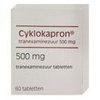 CyklokapronCyklokapron (Tranexamic acid) is used for short-term control of bleeding in hemophiliacs, including dental extraction procedures.as low as $2.32
CyklokapronCyklokapron (Tranexamic acid) is used for short-term control of bleeding in hemophiliacs, including dental extraction procedures.as low as $2.32